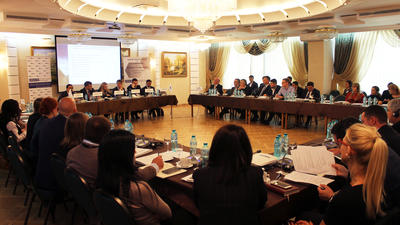-
Our work
-
Fields of work
- Arms control
- Border management
- Combating trafficking in human beings
- Conflict prevention and resolution
- Countering terrorism
- Cyber/ICT Security
- Democratization
- Economic activities
- Education
- Elections
- Environmental activities
- Gender equality
- Good governance
- Human rights
- Media freedom and development
- Migration
- National minority issues
- Policing
- Reform and co-operation in the security sector
- Roma and Sinti
- Rule of law
- Tolerance and non-discrimination
- Youth
- Field operations
- Projects
-
Meetings and conferences
- Summit meetings
- Review Conferences
- Ministerial Council meetings
- Plenary meetings of the Permanent Council
- Plenary Meetings of the Forum for Security Co-operation
- Security Review Conferences
- Annual Implementation Assessment Meetings
- Economic and Environmental Forum
- Economic and Environmental Dimension Implementation Meetings
- Human rights meetings
- Media conferences
- Cyber/ICT security conferences
- Conference of the Alliance against Trafficking in Persons
- Gender equality conferences
- Annual OSCE Mediterranean conferences
- Annual OSCE Asian conferences
- Partnerships
-
Fields of work
-
Countries
- All
-
Participating States
- Albania
- Andorra
- Armenia
- Austria
- Azerbaijan
- Belgium
- Belarus
- Bosnia and Herzegovina
- Bulgaria
- Canada
- Croatia
- Cyprus
- Czechia
- Denmark
- Estonia
- Finland
- France
- Georgia
- Germany
- Greece
- Holy See
- Hungary
- Iceland
- Ireland
- Italy
- Kazakhstan
- Kyrgyzstan
- Latvia
- Liechtenstein
- Lithuania
- Luxembourg
- Malta
- Moldova
- Monaco
- Mongolia
- Montenegro
- The Netherlands
- North Macedonia
- Norway
- Poland
- Portugal
- Romania
- Russian Federation
- San Marino
- Serbia
- Slovakia
- Slovenia
- Spain
- Sweden
- Switzerland – OSCE Chairpersonship 2026
- Tajikistan
- Türkiye
- Turkmenistan
- Ukraine
- United Kingdom
- United States of America
- Uzbekistan
- Asian Partners for Co-operation
- Mediterranean Partners for Co-operation
-
Structures and institutions
- Chairpersonship
-
Secretariat
- Secretary General
- Office of the Secretary General
- Conflict Prevention Centre
- Transnational Threats Department
- Office of the Special Representative and Co-ordinator for Combating Trafficking in Human Beings
- Office of the Co-ordinator of OSCE Economic and Environmental Activities
- Gender Issues Programme
- Opportunities for Youth
- Department of Human Resources
- Department of Management and Finance
- Office of Internal Oversight
- Documentation Centre in Prague
- Institutions
-
Field operations
- Presence in Albania
- Centre in Ashgabat
- Programme Office in Astana
- Programme Office in Bishkek
- Mission to Bosnia and Herzegovina
- Programme Office in Dushanbe
- Mission in Kosovo
- Mission to Moldova
- Mission to Montenegro
- Mission to Serbia
- Mission to Skopje
- Project Co-ordinator in Uzbekistan
- Closed field activities
- Parliamentary Assembly
- Court of Conciliation and Arbitration
- Organizational structure
- About us
News Item
OSCE workshop on e-commerce concluded in Chisinau
A four-day national workshop on trade facilitation for e-commerce bringing together more than 50 representatives from public authorities of Moldova and relevant businesses concluded on 4 October 2018 in Chisinau...

- Issued on:
- Issued by:
- OSCE Secretariat
- Fields of work:
- Economic activities
A four-day national workshop on trade facilitation for e-commerce bringing together more than 50 representatives from public authorities of Moldova and relevant businesses concluded on 4 October 2018 in Chisinau.
The workshop was organized by the Office of the Co-ordinator of OSCE Economic and Environmental Activities (OCEEA) in response to needs identified by the Moldovan authorities in the area of export facilitation and to security and revenue challenges associated with a growing volume of e-commerce and small, low-value consignments.
Senior representatives from the Customs Service, the Post of Moldova, the Ministry of Economy and Infrastructure, the National Bank of Moldova, the National Agency of Road Transport, the Consumer Protection Agency, the Economic Council to the Prime Minister/National Trade Facilitation Committee, the National Investment Agency, the Chamber of Commerce and Industry, private businesses, as well as the EU High Level Adviser to Moldovan Customs, discussed potential solutions for customs, postal operators and private stakeholders for the application of international standards in e‑commerce processes. They discussed the facilitation of cross-border e-commerce and tackling associated risks for safety and security.
The workshop was facilitated by international experts from the World Customs Organization (WCO), the United Nations Conference on Trade and Development (UNCTAD), the United Nations Economic Commission for Europe (UNECE), the European Commission Directorate-General for Taxation and Customs Union, DHL, as well as local experts.
“I must emphasize the strategic priorities to further advance in trade facilitation and paperless trade, which are attracting investments, innovative ideas and technologies, which cannot be achieved without consolidating a conducive business environment,” said Iuliana Drăgălin, Moldovan State Secretary of the Economy and Infrastructure Ministry. “Moldova’s Government has always emphasized the importance of government-business partnerships and a multi-stakeholder approach, which brings together representatives from governments, business, international organizations and e-commerce operators.”
Topics on the agenda included models for revenue collection, new tools for advanced electronic data exchange and data sharing among authorities, pre-arrival processing, simplifications to facilitate exports by micro and small enterprises, as well as tools to tackle safety and security aspects of e-commerce on technical and legislative levels. The workshop concluded with a summary document containing recommendations for Moldova.
Jonas Grätz, Economic Adviser at the OCEEA, said that a large number of active participants showed that interest in Moldova to explore new solutions to tackle security challenges and reap the economic benefits of growing cross-border e-commerce is great: “It is reassuring that the workshop concluded with a summary document including concrete recommendations that can be followed up upon by the authorities, the private sector, and donors.”
This activity is a part of the OSCE extra-budgetary project Promoting Connectivity in the OSCE, funded by Germany, Switzerland and Austria. Moldova is one of the beneficiary countries alongside Belarus and Kazakhstan.